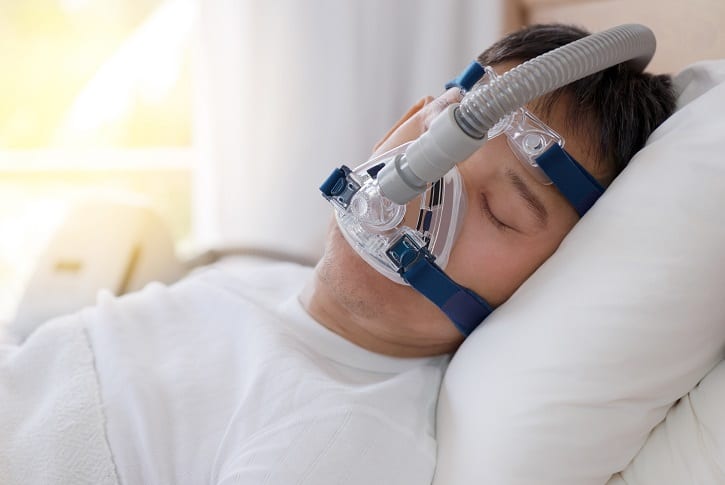- Is Your Snoring Affecting Your Relationship?
- The Causes of Snoring
- You Can Sleep Silently
- Could it Be Sleep Apnea?
- About Obstructive Sleep Apnea
- Obstructive Sleep Apnea vs Central Sleep Apnea
- Risk Factors for Sleep Apnea
- When Should You Seek Help?
- Why Treat Sleep Apnea?
- Customized Oral Appliances vs. store-bought
- Contact Dr. Krell for Effective Treatment
- Frequently Asked Questions

Is Your Snoring Affecting Your Relationship?
While some people may see snoring as a common quirk, it can have a large impact on the person closest to you — your spouse or partner. While you’re blissfully dreaming, your partner could be struggling to stay asleep due to the noise.
This can lead to sleep deprivation, which comes with serious health risks. A lack of sleep can lead to heart disease, kidney disease, depression, stroke, diabetes, and obesity. There are also risks that come with feeling lethargic throughout the day.
Many spouses of snorers end up retreating to a different room to be able to get to sleep. This can create tension in your relationship — but treatment for snoring can help.
The Causes of Snoring
Some of the causes of snoring are:
- The anatomy of your mouth
- Alcohol consumption
- Nasal issues
- Sleep deprivation
- The position you’re sleeping in
If you snore, don’t hesitate to contact Dr. Krell for an examination. You can reach us by calling (713) 877-1775 and we’ll schedule a consultation for you.
You Can Sleep Silently
If you snore, Dr. Krell can create a custom oral appliance or snore guard for you. He recommends the SILENT NITE oral appliance because it’s comfortable and doesn’t get in the way of regular breathing.
All you have to do is put the oral appliance in your mouth and fall asleep wearing it. It may feel strange at first, but it usually doesn’t take long to get used to wearing the appliance.
Could it Be Sleep Apnea?
If your snoring is loud and persistent, it may be a symptom of Obstructive Sleep Apnea (OSA). Not all snoring is a sign of OSA, but it’s a common sign of the disorder. It’s important to determine whether you have OSA or not because it can have serious and detrimental effects on your life.
About Obstructive Sleep Apnea
Obstructive sleep apnea (OSA) is characterized by repeated interruptions in breathing that happen while a person is asleep. Specifically, these interruptions last for 10 seconds or longer and occur at least five times each hour. These breathing episodes make it difficult for your brain to receive enough oxygen. OSA is the result of something blocking the airway, such as the tongue. The condition can vary in severity, based on the number of episodes you experience as you sleep.
Obstructive Sleep Apnea vs Central Sleep Apnea
Central sleep apnea (CSA) is a breathing disorder that occurs when the brain does not transmit signals to the muscles that are responsible for breathing. Both OSA and CSA cause breathing to stop and start in repeated episodes; however, CSA is not a mechanical issue, meaning it is not caused by a physical blockage that prevents breathing. CSA may be the result of certain medical conditions, such as Parkinson’s disease and kidney failure.
Risk Factors for Sleep Apnea
Some individuals are at an increased risk of sleep apnea than others and should remain vigilant of any sleep apnea symptoms they may experience. Risk factors of this condition include:
- Excess weight or obesity
- Taking certain medications, such as opioids
- Individuals 60 years or older
- Certain heart conditions, such as congestive heart failure
- Relaxed throat and tongue muscles when sleeping
Patients should also be aware that using alcohol sleeping pills can make sleep apnea symptoms worse in those who already have the condition.
When Should You Seek Help?
Sleep apnea causes many troubling symptoms. If you experience any of the following, it may be time to seek treatment:
Daytime drowsiness: Even when you get a full night’s sleep, sleep apnea can cause you to feel drowsy during the day. This is because your breathing and sleep are significantly disturbed during the night. This can make you feel less productive during the day and can even put you in dangerous situations if you are feeling extremely sleepy while driving, riding a bike, or even walking.
Loud snoring: Snoring is a common symptom of sleep apnea, but you may not realize you do it until it is brought to your attention. Extremely loud snoring can create a disruptive environment.
Disturbed sleep: Sometimes, sleep apnea can cause individuals to awake suddenly out of a deep sleep. This can lead to feelings of panic for the individual and may make it difficult to return to sleep.
Changes in mood: When you are unable to get the sleep you need to restore your mind and body, mood changes can occur. You may also have trouble concentrating on tasks and may notice that you are more forgetful, both of which should be taken seriously.
Why Treat Sleep Apnea?
Sleep apnea on its own can be a challenge to deal with, but did you know this condition can lead to other serious medical problems? You may be at an increased risk of developing the following conditions if you suffer from sleep apnea:
Stroke: Untreated sleep apnea can raise your risk of stroke, which occurs when there is a blockage in the blood vessels that delivers blood to the brain.
Heart problems: Sleep apnea can also affect heart health and is associated with conditions such as hypertension and coronary artery disease.
Diabetes: Sleep apnea has been shown to affect the glucose levels of patients and increase their insulin resistance. When you stop breathing, carbon dioxide levels in the blood increase, which makes it difficult for your body to utilize insulin. Also, if you have diabetes, sleep apnea can make managing your condition more challenging.
Headaches: Sleep apnea headaches can sometimes occur in those with this condition, often manifesting as pain on both sides of the head. These headaches can occur upon waking after a night where repeated breathing interruptions have occurred and can last up to four hours.
Customized Oral Appliances vs. store-bought
Dr. Krell provides customized oral appliances to patients who suffer from sleep apnea. These devices can help keep your jaw in an optimal position, preventing breathing obstructions while sleeping. When you choose a professional for your customized mouth guards, you are ensured a comfortable and secure fit that is made to accommodate your specific dental anatomy. Store-bought oral appliances do not offer the same peace of mind. Additionally, they require the consumer to be responsible for molding the appliance to fit their teeth, often via unfamiliar or uncomfortable methods that involve heating the guard in warm water so that it is more flexible. Additionally, consumers purchasing store-bought oral appliances may not be able to verify the safety of the materials used to create the appliance, nor its effectiveness.
For successful sleep apnea treatment, contact our office to schedule your appointment with Dr. Krell.
Contact Dr. Krell for Effective Treatment
If you’ve been having trouble with snoring, Dr. Krell can provide a simple and effective solution for you. To learn more about how he can help you, contact our office by calling (713) 877-1775 or by filling out our online contact form, available on this page. We can’t wait to hear about how we can help you.




